Bloody 'Ichi the Killer' - Japanese Cinema in its Most Extreme Form
"My pain is constant and sharp, and I do not hope for a better world for anyone.
In fact, I wish my pain upon others. I don't want anyone to escape it."
- Masa Kakihara, Ichi the Killer
 First Blood
First Blood
"Ichi the Killer" is a film that boldly crosses boundaries, immersing viewers in the bloody and ruthless world of the Japanese Yakuza. Directed by Takashi Miike, a master of cinematic provocation, he has created a picture that continually shocks and fascinates, evoking mixed emotions. An adaptation of Hideo Yamamoto's manga of the same name, the film is a portrait of two psychopaths, albeit significantly different from each other: the titular character - Ichi, and his antagonist - Masa Kakihara. Miike's vision in "Ichi the Killer" is not just a bloody tale of revenge and madness but also a groundbreaking milestone in the history of Japanese cinema, breaking out of conventional frameworks and imposing its own, dark rules of the game.
This film, marked by shocking sincerity and tangible brutality, has become a cult work that continues to electrify and provoke. "Ichi the Killer" is much more than a violence-saturated thriller - it's a dark odyssey through the nooks and crannies of the human psyche, where the boundaries between sadistic pleasure and moral degeneration are constantly blurred. Every scene in the film is an explosion of violence that challenges the conventional view of aesthetics and ethics in cinema. This work boldly throws down the gauntlet to viewers, forcing them to confront a raw and disturbing image of human nature, where cruelty and madness go hand in hand with artistic vision. "Ichi the Killer" is a film that not only defines the boundaries of extreme cinema but also opens new perspectives in viewing brutality as a form of artistic expression.
"There is no love in your violence" - Masa Kakihara, Ichi the Killer
Gore Scenes Have Aged and No Longer Shock. Sadistic Violence at the Philosophical and Aesthetic Foundations of the World - Still Disturbing
When it was first released in 2001, Takashi Miike's "Ichi the Killer" was considered groundbreaking for its graphic and uncompromising depiction of violence and gore scenes. At that time, these extreme images evoked strong reactions of shock and unease among viewers.
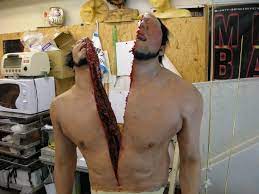
This film does not limit itself to the presentation of physical brutality but creates a world where violence is deeply rooted in the behaviors and motivations of its characters. This is a testament to how Miike has managed to create a work that remains equally provocative and disturbing, regardless of the passage of time and changing social norms. "Ichi the Killer" not only tests the limits of physical endurance but also forces reflection on the dark aspects of human nature, giving it a timeless dimension in the history of cinema.
"There is no love in your violence" - Masa Kakihara, Ichi the Killer
What Does 'Koroshiya Ichi' (殺し屋 一) Mean?
The title "Ichi the Killer", in its original Japanese "Koroshiya Ichi", carries a meaning that is quite significant for understanding both the manga and the film. In the Japanese kanji script, the word "koroshiya" (殺し屋) literally means "killer" or "murderer", which rather aptly describes the role of the main character Ichi. Meanwhile, "Ichi" (一) is a numeral meaning "one", which may symbolize the uniqueness or exceptionality of the character in the world presented.
Thus, the title conveys the essence of the manga and film - a story about a unique and unparalleled killer, whose actions and motivations are as complicated as they are ambiguous. This "Ichi" is on one hand an aspect of the infantile superhero that Ichi becomes after donning the suit, and on the other, the complete alienation and incompatibility of Ichi with the world as an "ordinary" person.
Kakihara: "Listen, when you're giving pain to someone, don't think about the pain that person is feeling. Just concentrate on how good it feels to be causing someone pain. That's the best thing you can do for a true masochist!" - Kakihara chained to Karen, attempting to cause him pain without much success
The Story of the Manga and Its Creator
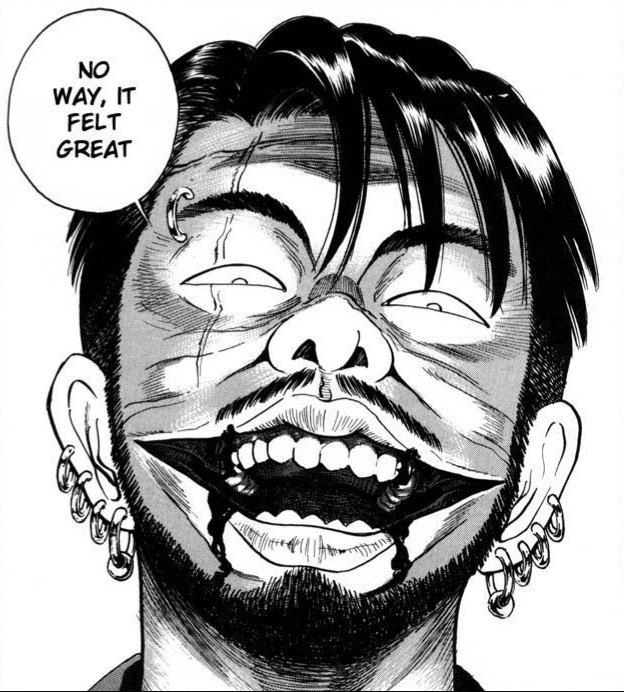
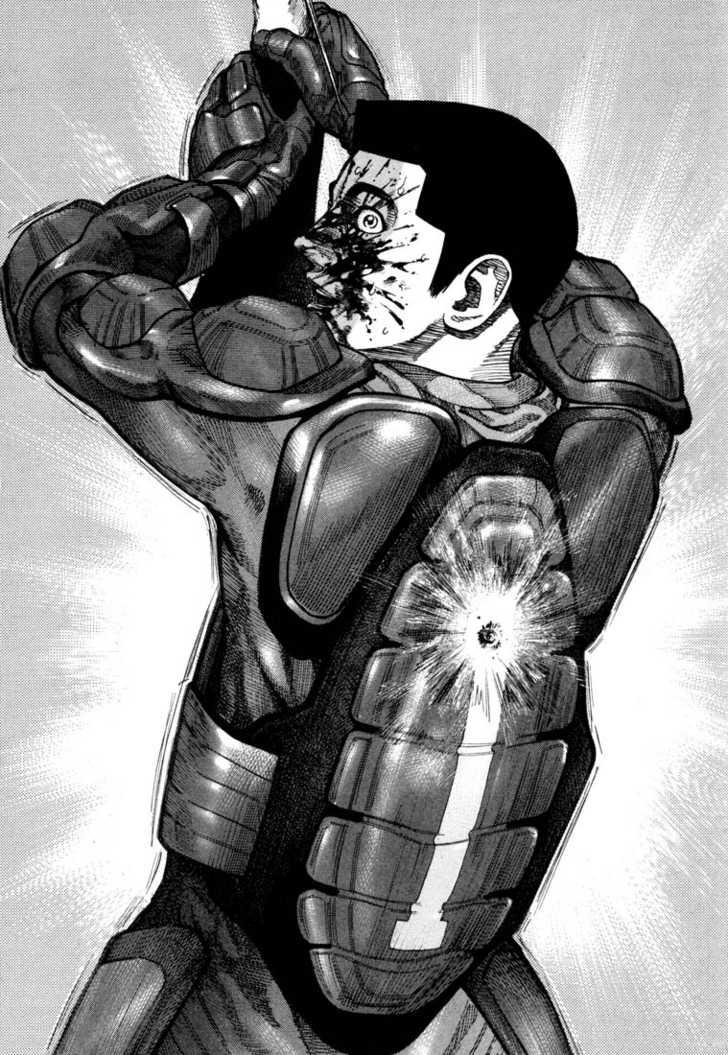
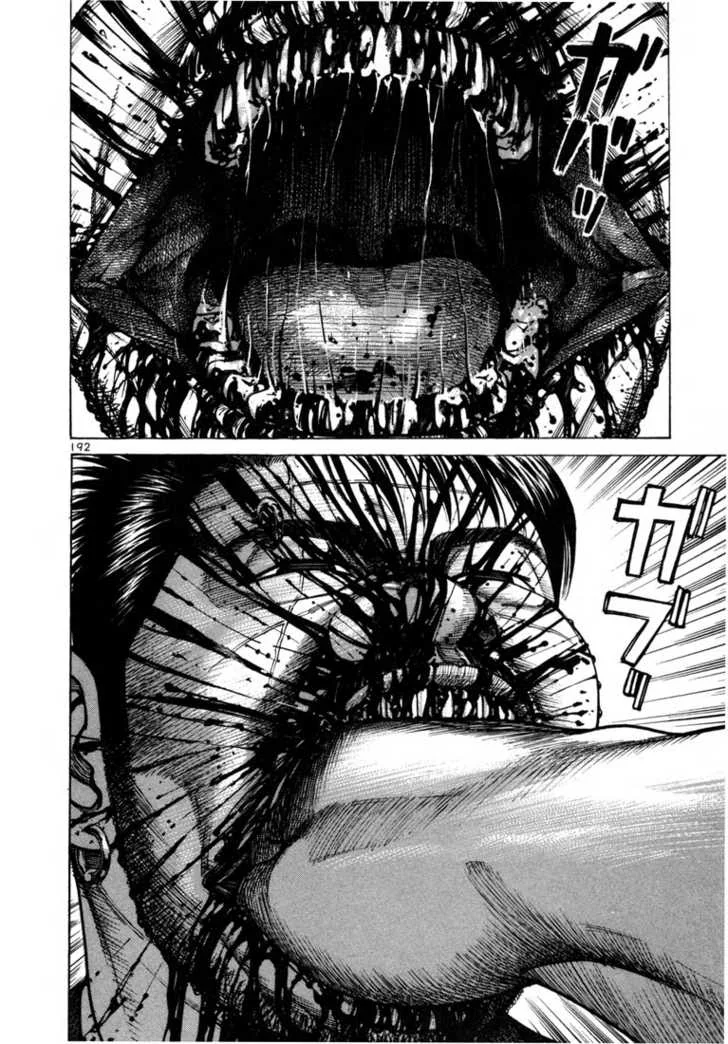
"Damn... There's no one left who can kill me..." - Masa Kakihara, Ichi the Killer
 The Making of 'Ichi the Killer'
The Making of 'Ichi the Killer'
"Ichi the Killer," directed by Takashi Miike and released in 2001, is a film that stands out for its experimental approach to cinematography and a tendency to cross the boundaries of conventional cinema. Miike, known for his distinctive style blending surrealism, extreme violence, and dark humor, was the perfect candidate to bring Yamamoto's bloody vision to the screen. While staying true to the spirit of the original manga, Miike's adaptation also introduced unique elements that accentuated his directorial vision.
Born in 1960, Takashi Miike began his film career in the 1990s and quickly gained a reputation as one of Japan's most daring directors. His filmography, which includes over a hundred titles, spans a wide range of genres from low-budget productions to major cinematic films, encompassing horror, drama, and comedy. Films like "Audition" (1999) and "Dead or Alive" (1999) earned him international acclaim, and his style is characterized by genre-blending, exploring taboos, and creating visually intense images. In "Ichi the Killer," Miike's experience in making Yakuza-themed films is combined with his unique, surreal aesthetic.
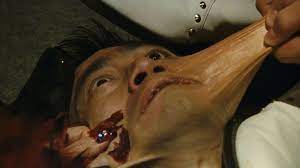
"That guy... Ichi... he's absolutely fascinating. The way he gives himself up to violence is almost... artistic." – Kakihara about Ichi
Plot and reflections
The Beginning of the Conflict: The Disappearance of Anjo
The plot of "Ichi the Killer" starts with the disappearance of the Yakuza boss Anjo, creating chaos in Tokyo's criminal world. His loyal and sadistic subordinate, Kakihara, begins a search that quickly turns into a bloody trail of violence. Here arises the first philosophical theme: the pursuit of truth and justice in a world where both concepts are distorted by violence and corruption.
 Ichi: A Killer with a Past
Ichi: A Killer with a Past
The introduction of the character Ichi, the titular assassin, reveals his complex and traumatic past. His actions, though brutal, are motivated by deeply rooted psychological issues and manipulation by Jijii, a former policeman. This layer of the plot raises questions about the nature of evil: is it innate, or is it a result of external circumstances and manipulation?
 Kakihara: Sadistic Obsession
Kakihara: Sadistic Obsession
Kakihara, characterized by his sophisticated brutality, becomes the driving force of the action. His methods and the sadistic pleasure he derives from pain (both his own and others') raise issues about the limits of human endurance and the perverse nature of human desires. His character questions the boundaries of human identity and morality in extreme situations.
 The Spiral of Violence
The Spiral of Violence
As the plot unfolds, we see how violence escalates and becomes a self-perpetuating spiral, where the lines between victim and perpetrator become increasingly blurred. Philosophically, the film explores the cyclical nature of violence and its ability to destroy both individuals and communities. Viewers are forced to confront whether violence is an inevitable part of the human experience.
 The Confrontation Between Ichi and Kakihara
The Confrontation Between Ichi and Kakihara
A key moment in the film is the confrontation between Ichi and Kakihara. This clash of two radically different characters, representing different aspects of human aggression and pain, is the climax of the film. Their fight is a metaphor for the internal struggle between one's own demons and the desire to understand and accept one's identity.
 Conclusion: Resolution and Philosophical Implications
Conclusion: Resolution and Philosophical Implications
The film's conclusion, leaving viewers with many unresolved questions, is a deliberate choice by the director, forcing reflection on the lasting impact of violence on human life. The ultimate fate of the characters questions the possibility of redemption and healing after experiencing trauma. "Ichi the Killer," in its essence, is a study of the human condition, exploring the dark aspects of the human mind and society, and the ending remains open, allowing viewers to make their own interpretations and conclusions.
Ichi: Did you really want me to rape you, Miss Tachibana?
Karen: Oh, no. I didn't want it from you. I wanted it from anyone. The only thing that can help me now is despair.
Other Characters in the Movie
 Jiro and Saburo Brothers
Jiro and Saburo Brothers
The Kaneko brothers, unique characters in the film, bring an element of dark humor and grotesque. Their distinctive dog costumes symbolize submissiveness and obedience to the brutal rules of the Yakuza world. Their behavior and interactions with other characters underscore the absurdity and perversity of this environment, simultaneously showing how far people can go to survive in this dark world.
 Jijii
Jijii
Jijii, a former policeman and the manipulator behind Ichi's actions, is a key figure in the film. His cold calculation and manipulation of Ichi demonstrate how power and control can be used for one's own dark purposes. Jijii, seemingly on the margins, is the true catalyst for chaos and violence, highlighting the complexity of character motivations and actions in the film.
Kaneko
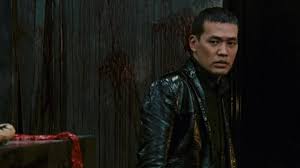
 Takeshi
Takeshi
Takeshi is a character that plays an important role in creating a deeper emotional context for the story. As the son of Kaneko, a former policeman who lost his service weapon, Takeshi is in a difficult situation as an innocent child entangled in the brutal world of adults. His character shows the tension between the Yakuza world and ordinary life, simultaneously highlighting innocence and susceptibility to external influences. In a film full of violence and dark characters, Takeshi represents innocence and human sensitivity, making him an important part of the plot, showing the consequences of criminal life for loved ones.
 Karen
Karen
As a prostitute whose paths cross with Kakihara, Karen represents another aspect of the dark world depicted by Takashi Miike. Her character is complicated; she is both a victim of circumstances and a figure showing some degree of manipulation and cunning. Karen, in her interactions with Kakihara, reveals the complex dynamics between desire and violence. Her attempts to get close to him and interest him are imbued not only with fear but also fascination, highlighting the complexity of human emotions and motivations in a world full of violence. Through her presence in the film, Karen adds a female perspective to the narrative, which is both exploited and ambiguous, showing how women can be both the subject and object in a world dominated by male violence.
 Sailor, the Prostitute Beaten by a Pimp
Sailor, the Prostitute Beaten by a Pimp
The character of the prostitute, who is regularly beaten by her pimp and eventually saved and then murdered by Ichi, does not have a clearly defined name. This character serves more of a symbolic role in the film, representing the cruelty and brutality of the depicted world. Her tragic fate highlights the dark aspects of Ichi's character and the ruthlessness and cruelty of the environment in which he operates. She is important for illustrating the extreme violence in the film and for showing the impact such violence has on individual characters. Her fate is one of the key points of the plot, showing both the destructive nature of Ichi and the overall brutality and ruthlessness of the world in which he operates.
Differences Between the Manga and the Film 'Ichi the Killer'
 Visual Style and Depiction of Violence
Visual Style and Depiction of Violence
One of the most noticeable differences between Hideo Yamamoto's manga and Takashi Miike's film is the way violence is depicted and the visual style. The manga "Ichi the Killer" is characterized by detailed and realistic drawing style, allowing for a deep representation of both the physical and psychological aspects of violence. Miike's film, on the other hand, adopts a more surrealistic approach, often exaggerating the visual aspects of violence, giving it a more shocking and stylized character. This visual difference underlines the contrast between the media, each using its unique means of expression to present a similar story.
 Character Development and Psychological Depth
Character Development and Psychological Depth
In the manga, characters are developed in a more detailed way, allowing for a deeper understanding of their motivations and psychological background. Yamamoto focuses on the intricate psychology of the characters, including their complex interpersonal relationships and internal conflicts. Miike's film, due to time constraints, is not able to delve as deeply into the psychological background of each character, focusing more on dynamic action and visual impact. Although the main characters, such as Ichi and Kakihara, are still complex and fascinating, the film offers a more condensed version of their stories.
 Tone and Atmosphere
Tone and Atmosphere
The atmosphere in the manga "Ichi the Killer" is dark and oppressive, but at the same time immersed in the realities of the Yakuza world. The manga offers a more nuanced approach to the depicted world, showing both brutality and the everyday life of the characters. Miike's film takes a more direct and aggressive approach to depicting the Yakuza world, often emphasizing extremity and grotesqueness. This difference in tone and atmosphere results from the different means of expression available in comics and film, allowing for different interpretations of the same story.
Ichi: From now on, I will be the one hitting you.
Sailor: You will?
Ichi: Yes. – dialogue between Ichi and the prostitute he saved from being beaten by her pimp, whom he then brutally murdered due to a misunderstanding.
What Makes 'Ichi the Killer' Unique and Innovative?
 Extreme Violence and Brutality
Extreme Violence and Brutality
One of the most shocking aspects of the film "Ichi the Killer" is its graphic and extreme depiction of violence. Takashi Miike spares no expense in presenting scenes that are not only brutal but often filled with grotesque and exaggerated cruelty. These moments, combining physicality and sadistic behavior of the characters, often cross the boundaries of what is commonly acceptable in mainstream cinema. Particularly controversial were the scenes of torture, self-mutilation, and the suggestive portrayal of sexual violence, which made the film a topic of heated discussions and debates about the limits in artistic cinema.
 Film Style and Aesthetics
Film Style and Aesthetics
The innovation of "Ichi the Killer" is not limited to the depiction of violence but also includes its unique styling and aesthetics. Miike experiments with film form, utilizing unconventional editing techniques, unusual camera angles, and a sophisticated play of colors and light. This unique aesthetic of the film not only enhances the visual impact of the brutal scenes but also creates a surreal, almost dreamlike mood that further separates the film from typical cinematic productions. The stylization of the film, though shocking, is simultaneously considered bold and innovative, pushing the boundaries of what is possible in cinematography.
Psychological Depth and Complexity of Characters
"Ichi the Killer" also stands out for its deep psychological characterization, particularly innovative in the context of films about violence and the Yakuza. Miike focuses not only on the brutality of the characters' actions but also on their internal motivations, conflicts, and disorders. Characters like Ichi and Kakihara are presented as complex and multi-dimensional, significantly diverging from stereotypical portrayals of villains. This complexity and psychological depth of the characters, combined with the extreme elements of the film, position "Ichi the Killer" as a unique and exceptional work in the world of cinema.
 Music and The Boredoms in 'Ichi the Killer'
Music and The Boredoms in 'Ichi the Killer'
The music in "Ichi the Killer" is a key element that significantly influences the atmosphere and perception of the film. The sound landscape created by the Japanese avant-garde band The Boredoms adds a unique dynamic and intensity to the film. Their experimental musical style, mixing elements of noise rock, punk, and even psychedelia, perfectly complements Takashi Miike's surreal and brutal world. Their unconventional structure and intense, often chaotic sounds, amplify the feeling of unease and unpredictability, which are key to the film.
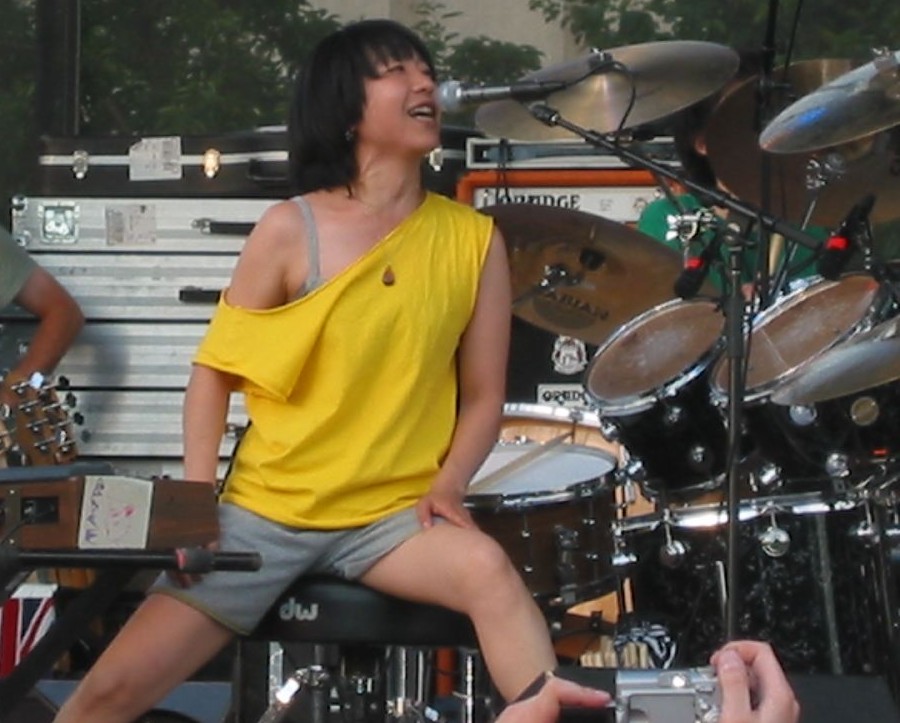
 Reception of 'Ichi the Killer' in Japan and Worldwide
Reception of 'Ichi the Killer' in Japan and Worldwide
Takashi Miike's "Ichi the Killer" elicited extreme reactions both in Japan and internationally. In Japan, where cinema often explores taboo subjects, the film met with a mix of fascination and controversy. Its brutality and extreme violence sparked a discussion about the limits in art and cinematography. On the international market, especially at film festivals, "Ichi the Killer" gained cult status, attracting the attention of independent cinema enthusiasts and horror genre fans. However, for many viewers and critics, particularly in the West, the film's extreme violence and shocking content were difficult to accept, often resulting in negative reviews.
In some countries, including Germany and Norway, the film faced bans or distribution restrictions due to its brutality and graphic scenes of violence. The controversial nature of the film, combined with its unique style and approach to violence, made it the subject of numerous debates on censorship and artistic freedom. Despite this, the film gained international recognition among fans of extreme and avant-garde cinema, becoming a cult work in the genre.
Message of 'Ichi the Killer'
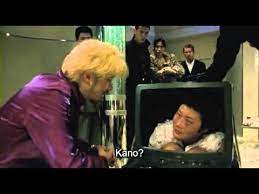
The message of "Ichi the Killer" can be interpreted as a profound study of the nature of violence and its impact on the human psyche. Takashi Miike's film not only portrays violence in its raw, uncensored form but also examines how it is rooted in social and individual life. Violence in the film is not one-dimensional; it is depicted as a tool of control, a means of expression, and even an art form. Miike in his work questions the boundaries between violence and art, showing how brutality can become bizarrely aesthetic in the hands of characters like Kakihara.
 Lost and Alienated in a World of Violence
Lost and Alienated in a World of Violence
"Ichi the Killer" thoroughly explores the theme of alienation and the individual's lostness in a world full of violence and chaos. The character of Ichi, simultaneously a perpetrator and a victim, symbolizes the torn between internal demons and social influence. His coerced actions, resulting from Jijii's manipulation, illustrate how an individual can become a tool in the hands of larger, darker forces. This theme emphasizes the tragic human condition in a world where the boundaries between good and evil are unclear, and violence becomes a form of escape from one's own inner void.
 Moral Ambiguity and Questions About the Nature of Evil
Moral Ambiguity and Questions About the Nature of Evil
A key message of "Ichi the Killer" is the exploration of moral ambiguity and the nature of evil. Characters in the film are not unequivocally good or bad; instead, they are presented as complex, full of contradictions, forcing the viewer to reflect on their own moral judgments. The film challenges traditional concepts of justice, guilt, and punishment, posing questions about what truly drives human actions – is it free will, or the inevitability of fate shaped by past and society? In this way, "Ichi the Killer" becomes not just a film about violence but a profound meditation on human nature and the inevitable consequences of our choices.
Conclusion
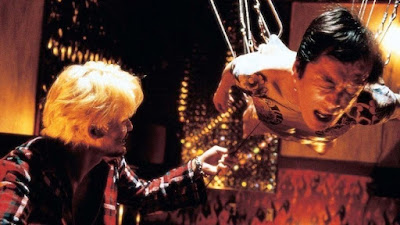
"Ichi" has left a deep and lasting impression in the world of cinema and pop culture. Its controversial content, innovative aesthetics, and influence on subsequent generations of creators make it not only an important work in Takashi Miike's career but also a key reference point in the history of cinematography. To this day, it remains an important part of the debate on violence in media, artistic freedom, and more broadly – violence in the world and within the individual. It is also one of the few mainstream works that address such themes as the aesthetics of violence and sadism.
"Listen, when you're giving pain to someone, don't think about the pain that person is feeling. Just concentrate on how good it feels to be causing someone pain. That's the best thing you can do for a true masochist." – Kakihara to Karen
>> SEE SIMILAR ARTICLES:
Horror in Anime: How Animation Transports Deepest Fears onto the Screen
"Strong Japanese Women"
see book by the author
of the page
未開 ソビエライ
An enthusiast of Asian culture with a deep appreciation for the diverse philosophies of the world. By education, a psychologist and philologist specializing in Korean studies. At heart, a programmer (primarily for Android) and a passionate technology enthusiast, as well as a practitioner of Zen and mono no aware. In moments of tranquility, adheres to a disciplined lifestyle, firmly believing that perseverance, continuous personal growth, and dedication to one's passions are the wisest paths in life. Author of the book "Strong Women of Japan" (>>see more)
Personal motto:
"The most powerful force in the universe is compound interest." - Albert Einstein (probably)
Mike Soray
(aka Michał Sobieraj)
未開 ソビエライ
An enthusiast of Asian culture with a deep appreciation for the diverse philosophies of the world. By education, a psychologist and philologist specializing in Korean studies. At heart, a programmer (primarily for Android) and a passionate technology enthusiast, as well as a practitioner of Zen and mono no aware. In moments of tranquility, adheres to a disciplined lifestyle, firmly believing that perseverance, continuous personal growth, and dedication to one's passions are the wisest paths in life. Author of the book "Strong Women of Japan" (>>see more)
Personal motto:
"The most powerful force in the universe is compound interest." - Albert Einstein (probably)
Mike Soray
(aka Michał Sobieraj)
Write us...
Ciechanów, Polska
dr.imyon@gmail.com
___________________
inari.smart
Would you like to share your thoughts or feedback about our website or app? Leave us a message, and we’ll get back to you quickly. We value your perspective!
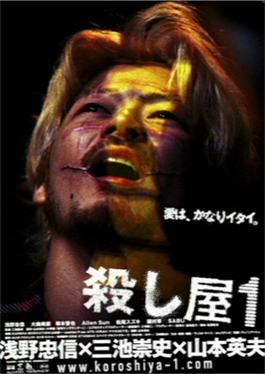 First Blood
First Blood


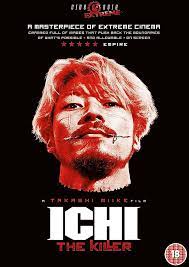 The Making of 'Ichi the Killer'
The Making of 'Ichi the Killer'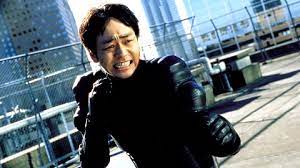 Ichi: A Killer with a Past
Ichi: A Killer with a Past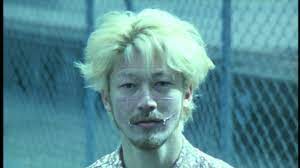 Kakihara: Sadistic Obsession
Kakihara: Sadistic Obsession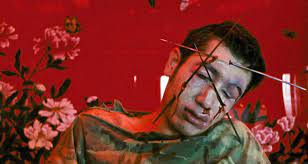 The Spiral of Violence
The Spiral of Violence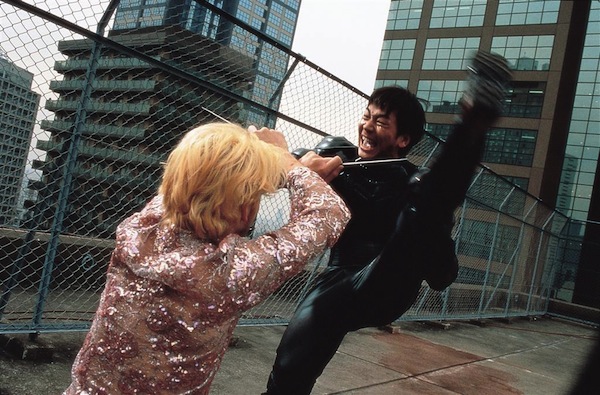 The Confrontation Between Ichi and Kakihara
The Confrontation Between Ichi and Kakihara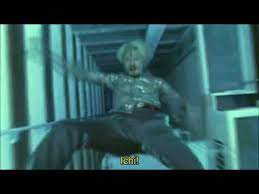 Conclusion: Resolution and Philosophical Implications
Conclusion: Resolution and Philosophical Implications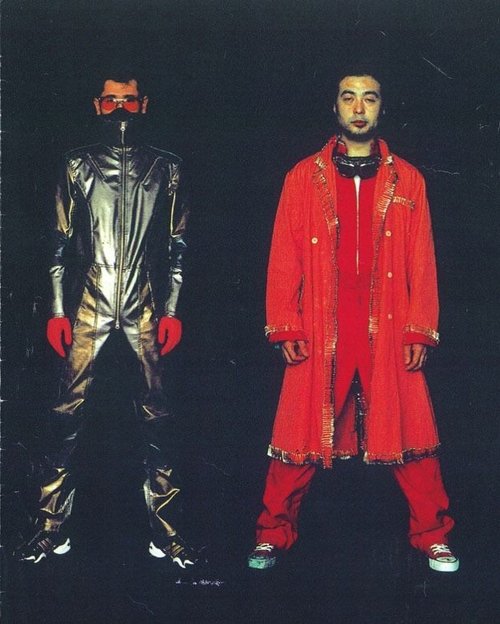 Jiro and Saburo Brothers
Jiro and Saburo Brothers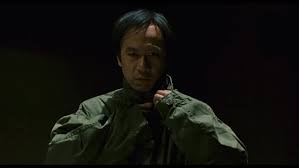 Jijii
Jijii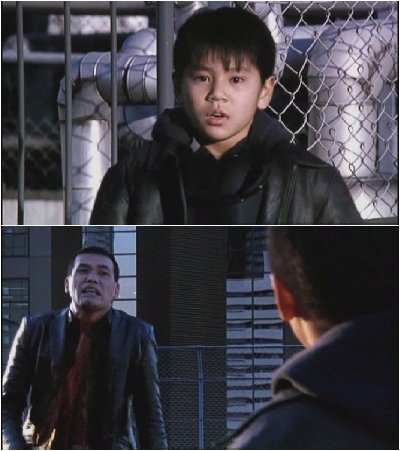 Takeshi
Takeshi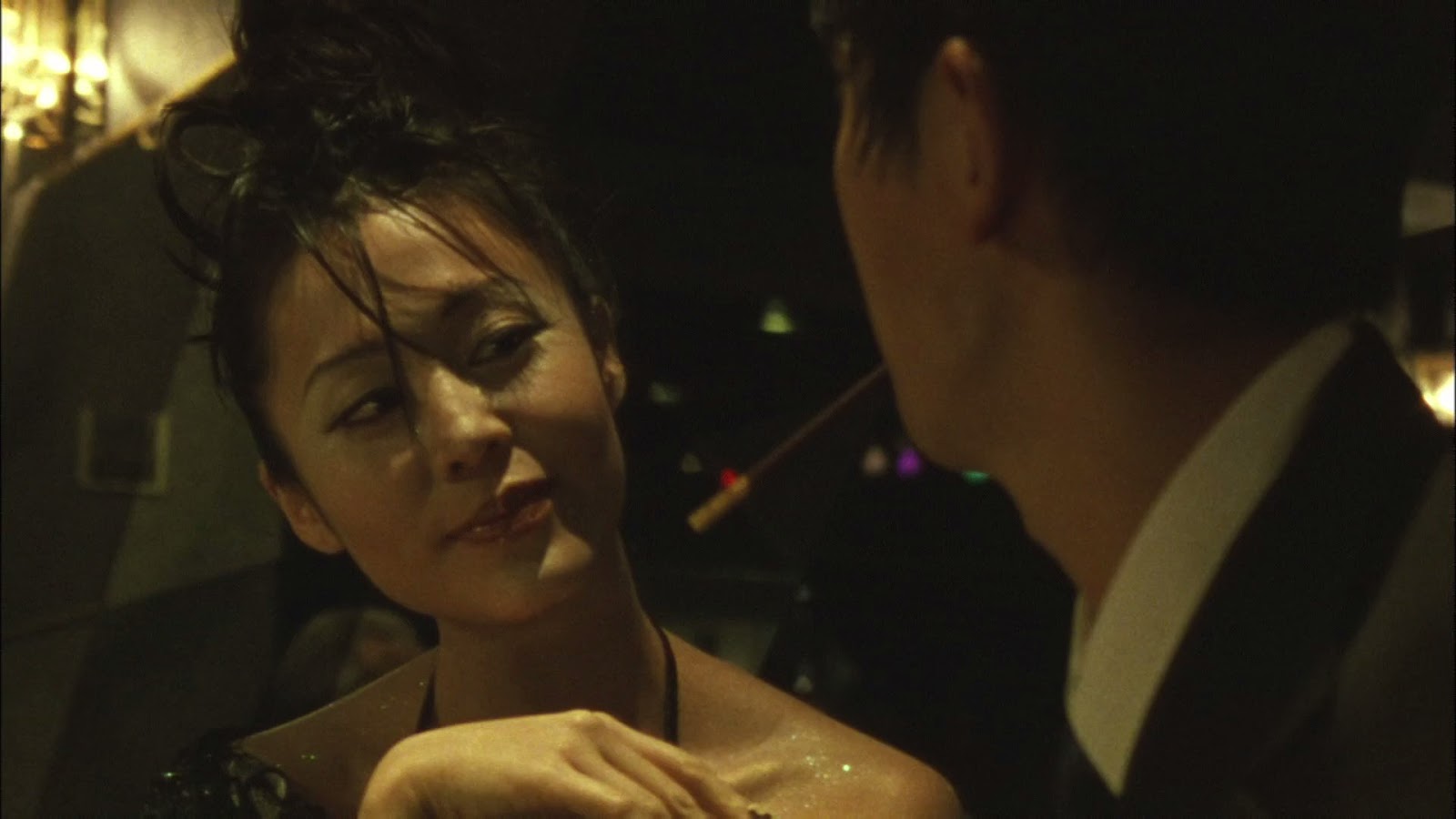 Karen
Karen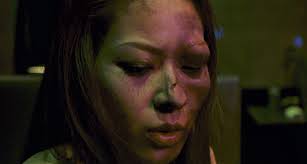 Sailor, the Prostitute Beaten by a Pimp
Sailor, the Prostitute Beaten by a Pimp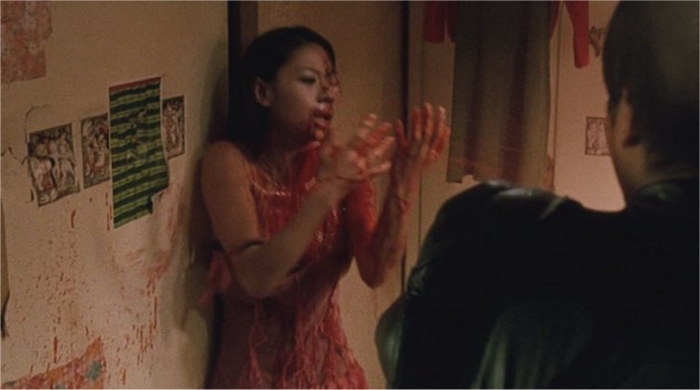 Visual Style and Depiction of Violence
Visual Style and Depiction of Violence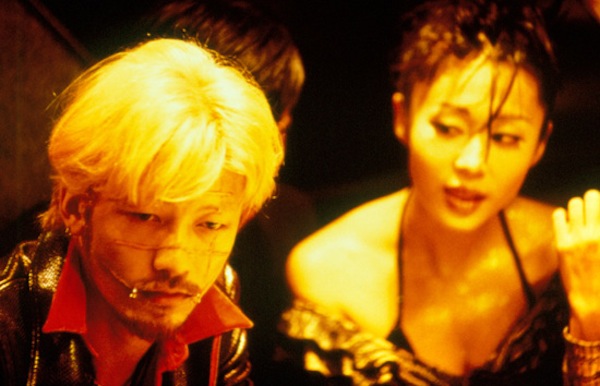 Character Development and Psychological Depth
Character Development and Psychological Depth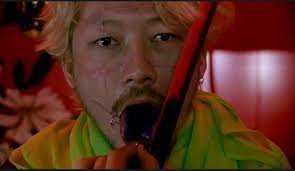 Tone and Atmosphere
Tone and Atmosphere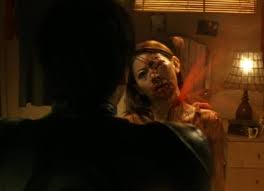 Extreme Violence and Brutality
Extreme Violence and Brutality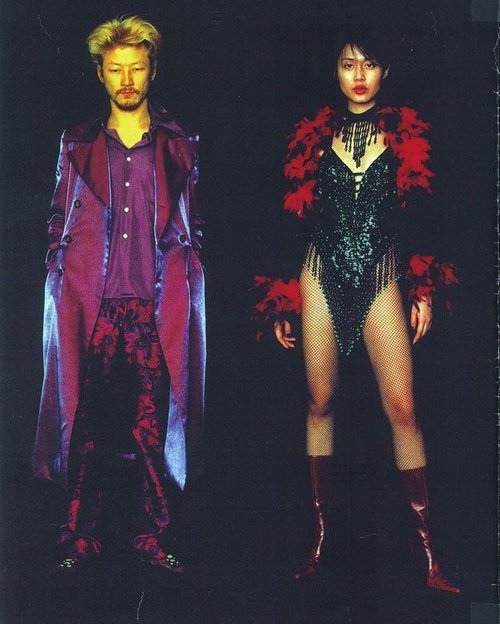 Film Style and Aesthetics
Film Style and Aesthetics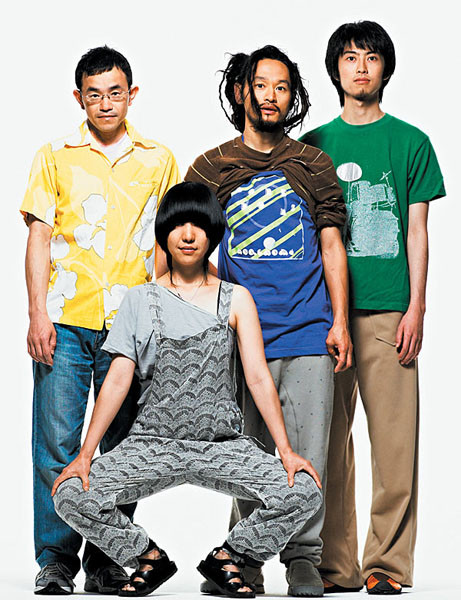 Music and The Boredoms in 'Ichi the Killer'
Music and The Boredoms in 'Ichi the Killer'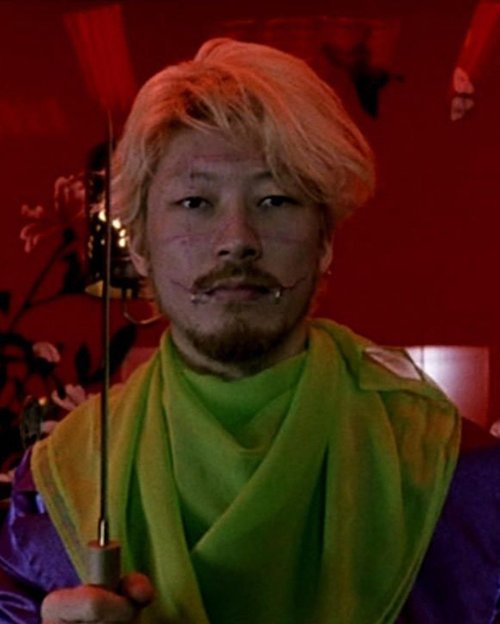 Reception of 'Ichi the Killer' in Japan and Worldwide
Reception of 'Ichi the Killer' in Japan and Worldwide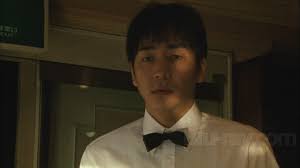 Lost and Alienated in a World of Violence
Lost and Alienated in a World of Violence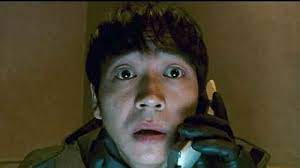 Moral Ambiguity and Questions About the Nature of Evil
Moral Ambiguity and Questions About the Nature of Evil

